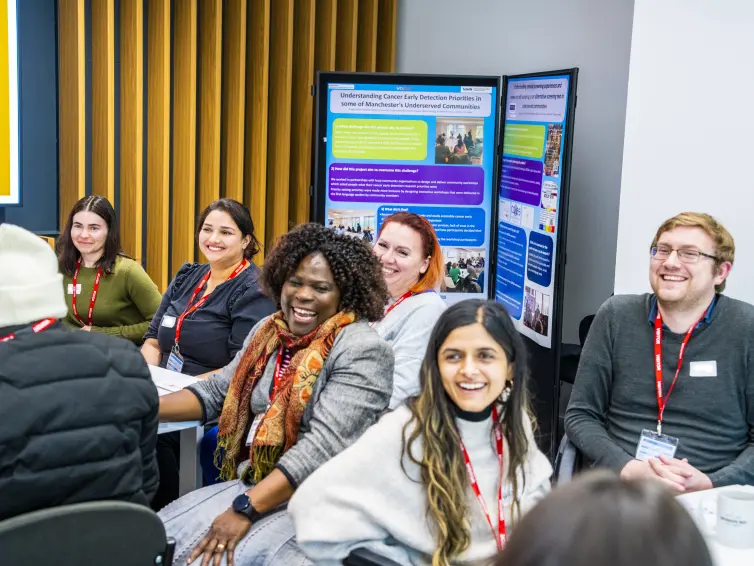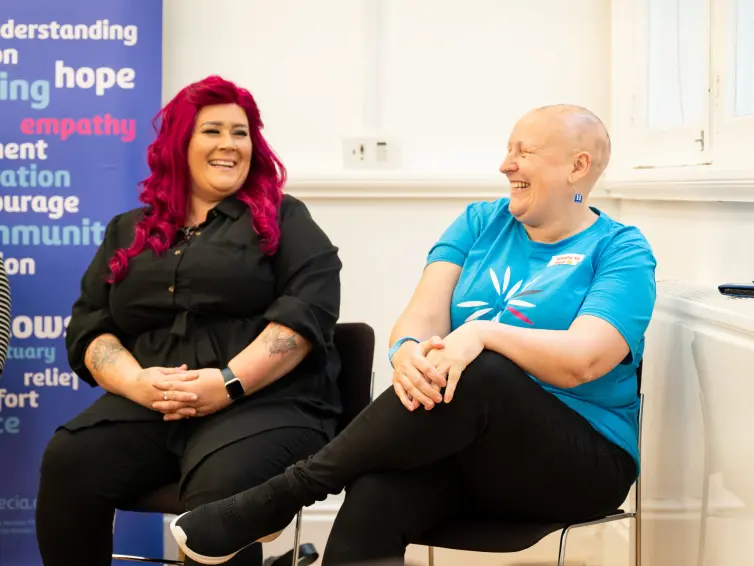Diverse voices on research involvement
Susannah from Vocal talks to researchers Sarah Dyball and James Bluett about listening to people's views on how to improve health research.
Sarah Dyball and James Bluett aim to improve outcomes for people with rheumatic and musculoskeletal conditions. They are collaborating with Vocal to improve equality, diversity and inclusion in research studies. Here, Sarah and James talk about their work and how members of Vocal Networks have helped to change their recruitment strategies.
Why is diversity important in clinical research?
Clinical research can help patients by enabling earlier diagnosis, more effective treatments, and better outcomes. People from Black, Asian and other ethnic minority heritages are often underrepresented in research studies, meaning that findings may not be taking their experiences into account.
We also know that musculoskeletal and rheumatic conditions can affect people from different ethnicities and communities in different ways. For example:
Lupus occurs more frequently in African, Caribbean, Asian and Hispanic people than in white Europeans
African-American patients with lupus are known to experience more severe and destructive disease
Ethnic minority patients with inflammatory arthritis are less likely to be in disease remission at three months following diagnosis
Involving a diverse range of people to take part in studies is key to make sure treatments work for the people who need them.
[My] aspiration is to make things better in the future.
Diverse Voices workshop participant
Can you tell us about your work?
We work on two different studies which focus on rheumatic and musculoskeletal conditions:
The IMID BioResource asks patients to donate blood and saliva samples, and to share some information about their health and lifestyle. This supports research across the UK into conditions such as rheumatoid arthritis, lupus and psoriasis.
The MIRA study is exploring how to best carry out research on how patients with rheumatoid arthritis could be supported to take their medication correctly.
We're both aware that the studies need to reach and include participants who are representative of the people living with these conditions. We want to improve diversity by involving more people from ethnic minority backgrounds and ensuring people feel welcomed and included in research.
What was the Diverse Voices on Research Involvement workshop?
We took part in an interactive workshop with public contributors from Black British, Black British Caribbean, Asian British Chinese and Asian British Indian ethnic backgrounds. We heard about their experiences and perceptions of clinical research, and their suggestions for how we could better communicate about opportunities to be involved and help to build trust.
I was struck by the challenges and barriers that are put in place within the system. We need to change it and make sure that potential participants from under-served populations are approached and offered the opportunity to take part in research studies.
James Bluett
What impact has the workshop had on your recruitment plans?
The workshop was a powerful example of how clinicians and patients can work together to make health research more inclusive and ensure that the questions asked are important to people who experience health inequalities. Together, we created a set of actions to improve the accessibility and relevance of our research to people from ethnic minority backgrounds. These are:
Identify the target population. Recruitment materials should be aimed at a particular group or community. There's no ‘one size fits all’.
Images must be representative. Participants shared that they like to see people’s faces in images, and they should represent the people that we’re aiming to reach.
Ensure staff are proactive. Research teams must talk to people from ethnic minority backgrounds about opportunities to be involved in research. We must ensure that research teams themselves are also diverse.
Provide information in different formats. It’s important that people taking part in research are fully aware of what’s involved so they can give their informed consent. A variety of material, such as infographics, videos and posters is needed.
What’s next?
As a result of the workshop, we’re making changes, such as updating the images on recruitment materials, so that they represent the people we’d like to involve.
Addressing health inequalities is a major strategic focus, so we’ll be sharing our learning and actions with research colleagues in the coming weeks.
We’re looking forward to following up with Vocal and the public contributors in six months to share our progress.


